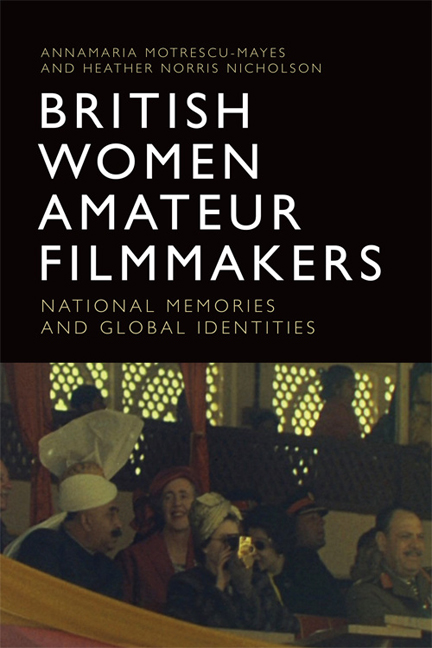Book contents
- Frontmatter
- Contents
- List of Figures
- List of Sources and Abbreviations
- Acknowledgements
- Foreword
- 1 Amateur Women Filmmakers as Producers of Cultural Meaning
- 2 Webs of Production and Practice
- 3 Resisting Colonial Gendering while Domesticating the Empire
- 4 Cameras Not Handbags: The Essential Accessory
- 5 Through Women's Lens: Imperial and Postcolonial Class and Gender Hierarchies
- 6 Teacher Filmmakers
- 7 British Women's Media Narratives of Gender and Collective Memory
- 8 Reimagining Boundaries: Amateur Animations
- Afterword
- Selected Bibliography
- Index
4 - Cameras Not Handbags: The Essential Accessory
Published online by Cambridge University Press: 12 November 2019
- Frontmatter
- Contents
- List of Figures
- List of Sources and Abbreviations
- Acknowledgements
- Foreword
- 1 Amateur Women Filmmakers as Producers of Cultural Meaning
- 2 Webs of Production and Practice
- 3 Resisting Colonial Gendering while Domesticating the Empire
- 4 Cameras Not Handbags: The Essential Accessory
- 5 Through Women's Lens: Imperial and Postcolonial Class and Gender Hierarchies
- 6 Teacher Filmmakers
- 7 British Women's Media Narratives of Gender and Collective Memory
- 8 Reimagining Boundaries: Amateur Animations
- Afterword
- Selected Bibliography
- Index
Summary
[E]nabled by their wealth and social rank, they were citizens of just about everywhere: the private home; the public world and the reaches of empire. (Williams 2000: 185)
Unlike the ubiquitous mimetic reach of contemporary social media devices, small enough to fit into the body, let alone a pocket or a bag, early amateur cinema concerned people with relative wealth and influence: if not quite the omnipotent world citizen elite, identified by Williams (2000: 185), still confident enough to record the world as they saw it. Filmmakers abroad enjoyed a freedom to film sustained by what Bhabha (1984: 129) calls the ambivalence of colonial discourse and also the dual complicity needed to maintain the mantle of civility. If the spurious entitlement to picture others rested upon increasingly contested notions of superiority based upon race, colour and class, back in Britain, dwindling imperial authority, international influence and economic strength were impacting subtly upon women's everyday lives too, along with the gradual decline in traditional privilege. This changing national identity and role on the world stage not only affected people's lives and shaped their responses in practical and personal ways: for filmmakers, as shown in this chapter, it informed the filmmaking context, whether or not at a conscious level.
Women's visual practice, in Lerner's (1977: xvi–xvii) words, helps to validate women's experiences and the rhythms of their lives. Away from fictional or story plays and other non-fiction club productions, their filmmaking was often biographical and autobiographical. It reflected immediate circumstances and self-sustained interests. Using oral histories, correspondence, archival and printed sources, this discussion foregrounds the enthusiasm, pride and achievement associated with filmmaking. Film remains the central raw material of enquiry but filmmakers’ practice and experiences feature too, reflecting interviewees’ interests and pertinent historical issues. Commonalities link different stories and hold relevance for women's visual practices and literacies studied elsewhere and, given the richness of this little-mined amateur visual record, still awaiting discovery.
These filmmakers were not hobby press readers and had little or no sustained contact with organised amateur activity although occasionally they later linked with clubs. Their discovery has often been serendipitous.
- Type
- Chapter
- Information
- British Women Amateur FilmmakersNational Memories and Global Identities, pp. 89 - 109Publisher: Edinburgh University PressPrint publication year: 2018



